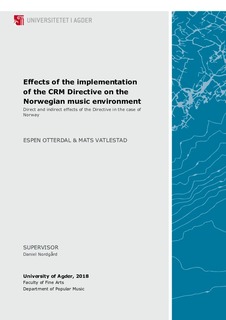| dc.description.abstract | Since the beginning of digitalisation, the music industries have struggled to develop systems
for the accurate and fair collection and distribution of remuneration for the exploitation of
rights. Systems are often found to be less than optimal, as a consequence of them being
designed to work in an offline environment that is no longer present, making them outdated
and dysfunctional. Ideally, such systems are developed naturally in tandem with disruption
and change. This however, does not always happen, and it is in cases like these that
lawmakers are forced to step in. Legislation does have a remarkable tendency of arriving late,
often years after the need for it arises; but if the need is there, legislation will eventually make
its appearance.
This thesis is a study on the implications of the CRM Directive on the Norwegian field of
rights management and the Norwegian music environment. The study seeks to present the
case of Norway as it is today, the relevance of the Directive in this regard, and the viewpoints
of important individuals linked to the Norwegian organisational environment. In order to do
so, relevant theory and analyses of the CRM Directive and interviews with leading
professionals in Norway have formed the basis for evaluating the circumstances and
challenges surrounding the field.
The findings of the study suggest that the Norwegian environment is both a modern and
favourable place to be for rights holders, but that some changes will have to occur in order for
the industry to be able to meet the challenges ahead. Although digital change has a
longstanding tradition of being met with fear and resistance, this thesis will show that the
Directive might not be so scary or radical after all. Perhaps, this time the EU has managed to
find a solution to the problems with collective rights management that the industry is willing
to accept. | nb_NO |

